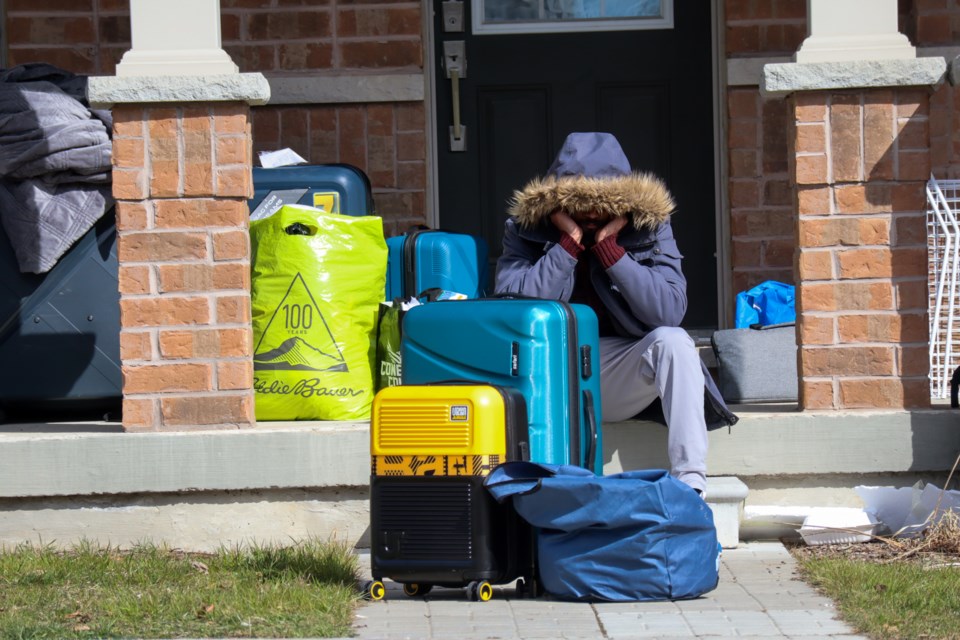7Neighbours of suspected rooming houses in Cambridge have complained to the city about increased garbage, lack of parking and dangerous overcrowding.
But housing experts believe landlords and tenants that break the rules by cramming more than two beds into a room are the rentals of the future and the city should get used to it.
Kayla Andrade, CEO and founder of the Ontario Landlords Watch, an organization that specializes in advocating for landlords across the province, says rooming houses will continue to thrive in Cambridge because landlords stand to make more money and people are desperate for places to live.
"We are in the middle of a housing crisis and everything is getting more expensive. If it makes more sense for landlords to rent out by the room so they can cover all of their costs, they will continue to become a popular option," Andrade says.
And it's not always the fault of landlords when overcrowding spirals out of control.
Sometimes it's tenants who take it upon themselves to bring more guests into homes than what was originally on the lease, she says.
The way the legislation is set up, there's no limit on the amount of time those "guests or visitors" can stay.
The situation has prompted Andrade and other landlords to call for change in provincial legislation to better protect property owners.
As it stands now, getting unwanted guests or tenants evicted is a process that can take up to a year at the overwhelmed Landlord Tenant Board (LTB), she says.
"The province has really dropped the ball on this and they need to make changes. I mean, we change housing ministers more than we change underwear," she says.
Those evictions don't only take time, they take money since the onus is on landlords to prove their tenants have been breaking the law and creating unsafe living environments.
"Even if you suspect that your house is being occupied with an overcrowding situation, you have to be able to prove it beyond a reasonable doubt," Andrade says.
"This is not an easy task if your tenants move everything out while you do your inspection. And you can only do so many inspections before it could be considered harassment."
As Canada's housing and affordability crisis continues, rooming houses will operate in a grey area for municipalities, tenants and landlords.
While landlords want more power to evict and remove unwanted guests from their homes, housing and tenant advocates say shared living spaces can be a viable short-term option for those looking to stay off the streets and put a roof over their heads.
"The key here is if they are done correctly, because there are landlords out there who want to circumvent legislation since renting out per room is a more lucrative option," says Pataida Mzite, a paralegal with Waterloo Region Community Legal Services.
Around a third of the cases she deals with involve tenants trying to secure the right to housing after being issued a notice for overcrowding.
Mzite agrees with Andrade that change needs to happen, but both are looking at opposite ends of the spectrum.
Mzite wants to put more rights into the hands of the tenants to prevent them from being taken advantage of by bad actors.
"Housing is a fundamental human right and regulation needs to start at the top. The landlord needs to be educated, landlords need to be regulated, they need to be held accountable," she says.
Mzite adds she's had to defend the validity of a resident's tenancy at the LTB and often works around municipal fire code and bylaws to make sure these individuals in rooming houses don't end up homeless.
"It's very much a tightrope that these operate on, because on one hand the landlord wants to secure their property, but on the other, the residents are facing homelessness. Like, where do they go?"
The idea of regulating landlords has been tested in other municipalities to varying success.
Requiring landlords to get a licence before renting out a unit puts more emphasis on accountability, but it also adds a lot of red tape to a system where housing is a commodity, Andrade says.
"If the City of Cambridge implemented a licence for landlords, it would be devastating and would simply make things a lot more difficult," she adds.
"We are already seeing landlords leave the market, because they do not want to get taken advantage of by bad tenants or can't deal with the rising costs of just about everything."
But Mzite thinks that making landlords conform to some sort of regulatory framework and be subject to inspections is a great way to start changing a system she believes is "on life support."
"I think that landlord permits would help everybody in a long-term situation. I just think that there are benefits at this time in this economy that far outweigh the detriments," she says.
"Everything is subjective, so there's going to be hiccups, but even just to get the ball rolling it's trial and error. I feel like that's a lot of how the law works."
Cambridge Ward 8 councillor Nicholas Ermeta has promised a public meeting where residents and stakeholders can voice their concerns about rooming houses, but when that meeting will happen is anyone's guess.
In the meantime, Andrade urges anyone with a concern to speak up.
If pressure is taken off the city and the conversations stop, there will never be any meetings and the voices of the community won't be heard, she says.



